

Go to the source code of this file.
Data Structures | |
| struct | LZ4_stream_t_internal |
| struct | LZ4_streamDecode_t_internal |
| struct | LZ4_stream_t_internal |
| struct | LZ4_streamDecode_t_internal |
| union | LZ4_stream_u |
| union | LZ4_streamDecode_u |
Typedefs | |
| typedef union LZ4_stream_u | LZ4_stream_t |
| typedef union LZ4_streamDecode_u | LZ4_streamDecode_t |
| typedef struct LZ4_stream_t_internal | LZ4_stream_t_internal |
Functions | |
| LZ4LIB_API int | LZ4_versionNumber (void) |
| library version number; useful to check dll version | |
| LZ4LIB_API const char * | LZ4_versionString (void) |
| library version string; unseful to check dll version | |
| LZ4LIB_API int | LZ4_compress_default (const char *src, char *dst, int srcSize, int dstCapacity) |
| LZ4LIB_API int | LZ4_decompress_safe (const char *src, char *dst, int compressedSize, int dstCapacity) |
| LZ4LIB_API int | LZ4_compressBound (int inputSize) |
| LZ4LIB_API int | LZ4_compress_fast (const char *src, char *dst, int srcSize, int dstCapacity, int acceleration) |
| LZ4LIB_API int | LZ4_sizeofState (void) |
| LZ4LIB_API int | LZ4_compress_fast_extState (void *state, const char *src, char *dst, int srcSize, int dstCapacity, int acceleration) |
| LZ4LIB_API int | LZ4_compress_destSize (const char *src, char *dst, int *srcSizePtr, int targetDstSize) |
| LZ4LIB_API int | LZ4_decompress_fast (const char *src, char *dst, int originalSize) |
| LZ4LIB_API int | LZ4_decompress_safe_partial (const char *src, char *dst, int srcSize, int targetOutputSize, int dstCapacity) |
| LZ4LIB_API LZ4_stream_t * | LZ4_createStream (void) |
| LZ4LIB_API int | LZ4_freeStream (LZ4_stream_t *streamPtr) |
| LZ4LIB_API void | LZ4_resetStream (LZ4_stream_t *streamPtr) |
| LZ4LIB_API int | LZ4_loadDict (LZ4_stream_t *streamPtr, const char *dictionary, int dictSize) |
| LZ4LIB_API int | LZ4_compress_fast_continue (LZ4_stream_t *streamPtr, const char *src, char *dst, int srcSize, int dstCapacity, int acceleration) |
| LZ4LIB_API int | LZ4_saveDict (LZ4_stream_t *streamPtr, char *safeBuffer, int maxDictSize) |
| LZ4LIB_API LZ4_streamDecode_t * | LZ4_createStreamDecode (void) |
| LZ4LIB_API int | LZ4_freeStreamDecode (LZ4_streamDecode_t *LZ4_stream) |
| LZ4LIB_API int | LZ4_setStreamDecode (LZ4_streamDecode_t *LZ4_streamDecode, const char *dictionary, int dictSize) |
| LZ4LIB_API int | LZ4_decoderRingBufferSize (int maxBlockSize) |
| LZ4LIB_API int | LZ4_decompress_safe_continue (LZ4_streamDecode_t *LZ4_streamDecode, const char *src, char *dst, int srcSize, int dstCapacity) |
| LZ4LIB_API int | LZ4_decompress_fast_continue (LZ4_streamDecode_t *LZ4_streamDecode, const char *src, char *dst, int originalSize) |
| LZ4LIB_API int | LZ4_decompress_safe_usingDict (const char *src, char *dst, int srcSize, int dstCapcity, const char *dictStart, int dictSize) |
| LZ4LIB_API int | LZ4_decompress_fast_usingDict (const char *src, char *dst, int originalSize, const char *dictStart, int dictSize) |
| LZ4LIB_API void | LZ4_resetStream_fast (LZ4_stream_t *streamPtr) |
| LZ4LIB_API int | LZ4_compress_fast_extState_fastReset (void *state, const char *src, char *dst, int srcSize, int dstCapacity, int acceleration) |
| LZ4_compress_fast_extState_fastReset() : A variant of LZ4_compress_fast_extState(). | |
| LZ4LIB_API void | LZ4_attach_dictionary (LZ4_stream_t *working_stream, const LZ4_stream_t *dictionary_stream) |
| LZ4_DEPRECATED ("use LZ4_compress_default() instead") LZ4LIB_API int LZ4_compress(const char *source | |
| LZ4_DEPRECATED ("use LZ4_compress_fast_extState() instead") LZ4LIB_API int LZ4_compress_withState(void *state | |
| LZ4_DEPRECATED ("use LZ4_compress_fast_continue() instead") LZ4LIB_API int LZ4_compress_continue(LZ4_stream_t *LZ4_streamPtr | |
| LZ4_DEPRECATED ("use LZ4_decompress_fast() instead") LZ4LIB_API int LZ4_uncompress(const char *source | |
| LZ4_DEPRECATED ("use LZ4_decompress_safe() instead") LZ4LIB_API int LZ4_uncompress_unknownOutputSize(const char *source | |
| LZ4_DEPRECATED ("Use LZ4_createStream() instead") LZ4LIB_API void *LZ4_create(char *inputBuffer) | |
| LZ4_DEPRECATED ("Use LZ4_resetStream() instead") LZ4LIB_API int LZ4_resetStreamState(void *state | |
| LZ4_DEPRECATED ("Use LZ4_saveDict() instead") LZ4LIB_API char *LZ4_slideInputBuffer(void *state) | |
| LZ4_DEPRECATED ("use LZ4_decompress_safe_usingDict() instead") LZ4LIB_API int LZ4_decompress_safe_withPrefix64k(const char *src | |
| LZ4_DEPRECATED ("use LZ4_decompress_fast_usingDict() instead") LZ4LIB_API int LZ4_decompress_fast_withPrefix64k(const char *src | |
Variables | |
| char * | dest |
| char int | sourceSize |
| char int int | maxOutputSize |
| const char * | source |
| const char char int | inputSize |
| char int | outputSize |
| char int | isize |
| char * | inputBuffer |
| char * | dst |
| char int | compressedSize |
| char int int | maxDstSize |
| char int | originalSize |
| typedef union LZ4_stream_u LZ4_stream_t |
| typedef union LZ4_streamDecode_u LZ4_streamDecode_t |
typedef struct LZ4_stream_t_internal LZ4_stream_t_internal [read] |
| LZ4LIB_API int LZ4_versionNumber | ( | void | ) |
| LZ4LIB_API const char* LZ4_versionString | ( | void | ) |
LZ4_compress_default() : Compresses 'srcSize' bytes from buffer 'src' into already allocated 'dst' buffer of size 'dstCapacity'. Compression is guaranteed to succeed if 'dstCapacity' >= LZ4_compressBound(srcSize). It also runs faster, so it's a recommended setting. If the function cannot compress 'src' into a more limited 'dst' budget, compression stops *immediately*, and the function result is zero. Note : as a consequence, 'dst' content is not valid. Note 2 : This function is protected against buffer overflow scenarios (never writes outside 'dst' buffer, nor read outside 'source' buffer). srcSize : max supported value is LZ4_MAX_INPUT_SIZE. dstCapacity : size of buffer 'dst' (which must be already allocated) return : the number of bytes written into buffer 'dst' (necessarily <= dstCapacity) or 0 if compression fails
Definition at line 1097 of file lz4.c.
References LZ4_compress_fast().
Referenced by compressLz4(), LZ4_compress(), and LZ4_compress_limitedOutput().
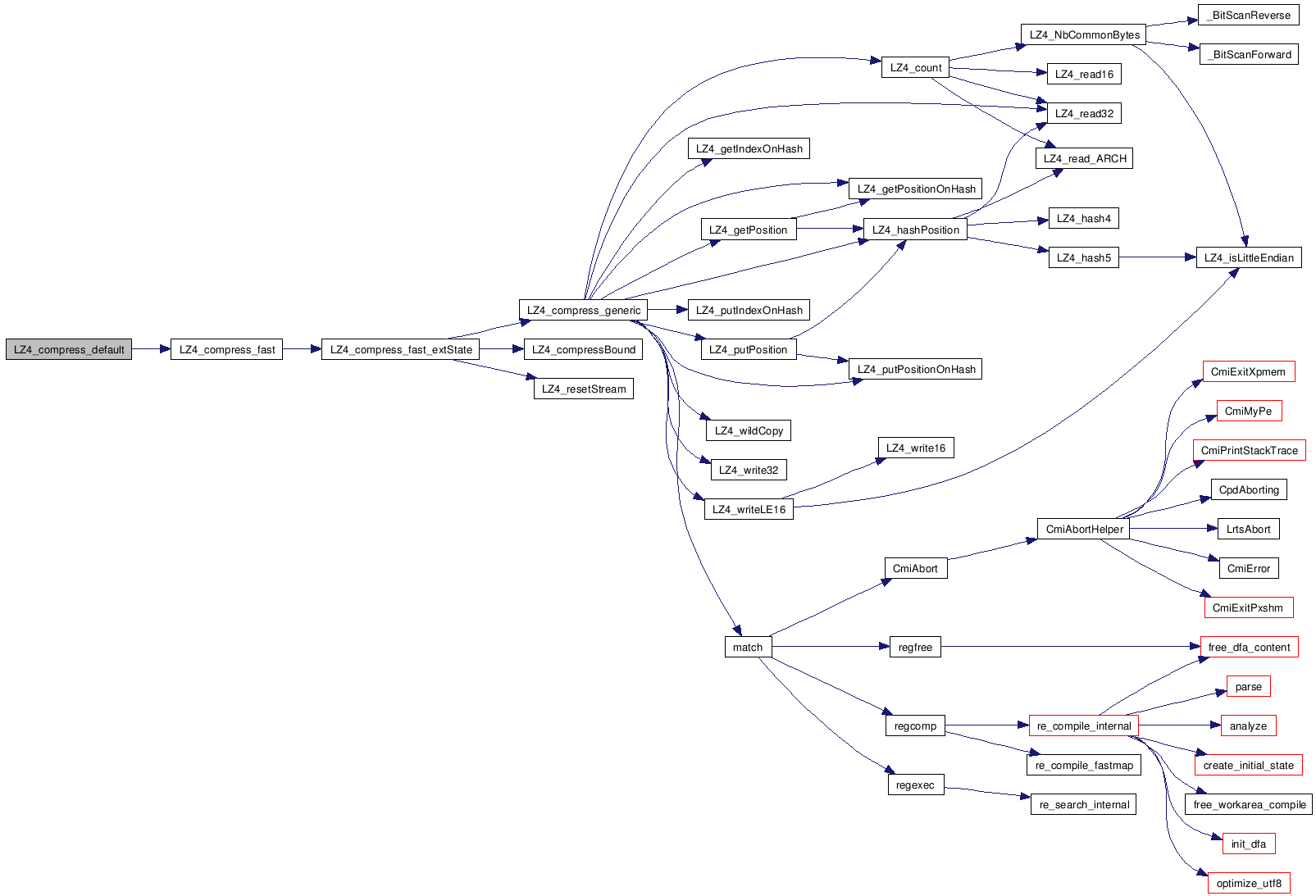

| LZ4LIB_API int LZ4_decompress_safe | ( | const char * | src, | |
| char * | dst, | |||
| int | compressedSize, | |||
| int | dstCapacity | |||
| ) |
LZ4_decompress_safe() : compressedSize : is the exact complete size of the compressed block. dstCapacity : is the size of destination buffer, which must be already allocated. return : the number of bytes decompressed into destination buffer (necessarily <= dstCapacity) If destination buffer is not large enough, decoding will stop and output an error code (negative value). If the source stream is detected malformed, the function will stop decoding and return a negative result. This function is protected against malicious data packets.
Definition at line 1651 of file lz4.c.
References decode_full_block, endOnInputSize, LZ4_decompress_generic(), and noDict.
Referenced by decompressLz4(), LZ4_decompress_safe_continue(), LZ4_decompress_safe_usingDict(), and LZ4_uncompress_unknownOutputSize().
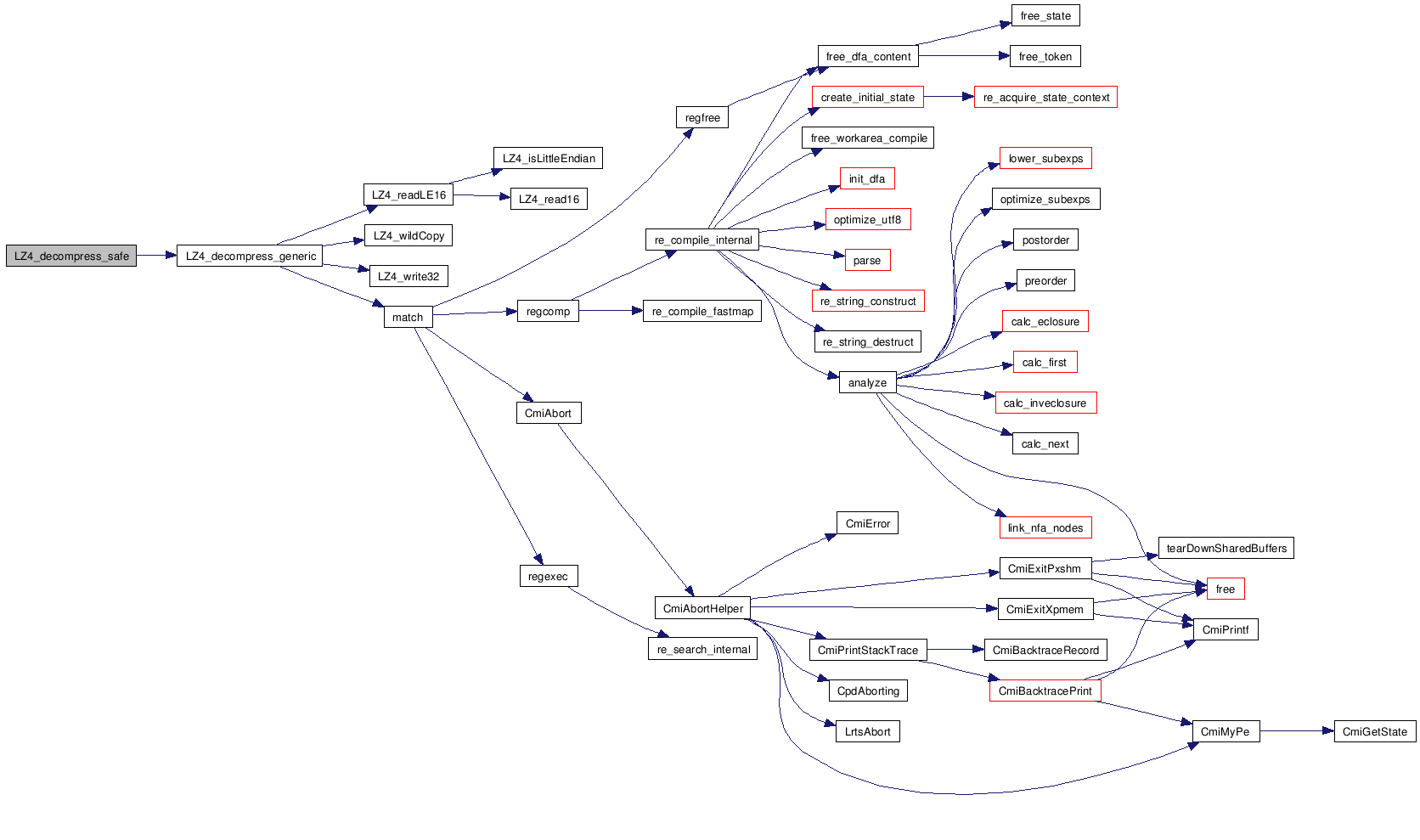

LZ4_compressBound() : Provides the maximum size that LZ4 compression may output in a "worst case" scenario (input data not compressible) This function is primarily useful for memory allocation purposes (destination buffer size). Macro LZ4_COMPRESSBOUND() is also provided for compilation-time evaluation (stack memory allocation for example). Note that LZ4_compress_default() compresses faster when dstCapacity is >= LZ4_compressBound(srcSize) inputSize : max supported value is LZ4_MAX_INPUT_SIZE return : maximum output size in a "worst case" scenario or 0, if input size is incorrect (too large or negative)
Definition at line 493 of file lz4.c.
Referenced by compressLz4(), CompressPersistentMsg(), LZ4_compress(), LZ4_compress_continue(), LZ4_compress_destSize_extState(), LZ4_compress_fast_extState(), LZ4_compress_fast_extState_fastReset(), and LZ4_compress_withState().

| LZ4LIB_API int LZ4_compress_fast | ( | const char * | src, | |
| char * | dst, | |||
| int | srcSize, | |||
| int | dstCapacity, | |||
| int | acceleration | |||
| ) |
LZ4_compress_fast() : Same as LZ4_compress_default(), but allows selection of "acceleration" factor. The larger the acceleration value, the faster the algorithm, but also the lesser the compression. It's a trade-off. It can be fine tuned, with each successive value providing roughly +~3% to speed. An acceleration value of "1" is the same as regular LZ4_compress_default() Values <= 0 will be replaced by ACCELERATION_DEFAULT (currently == 1, see lz4.c).
Definition at line 1078 of file lz4.c.
References LZ4_compress_fast_extState().
Referenced by LZ4_compress_default().
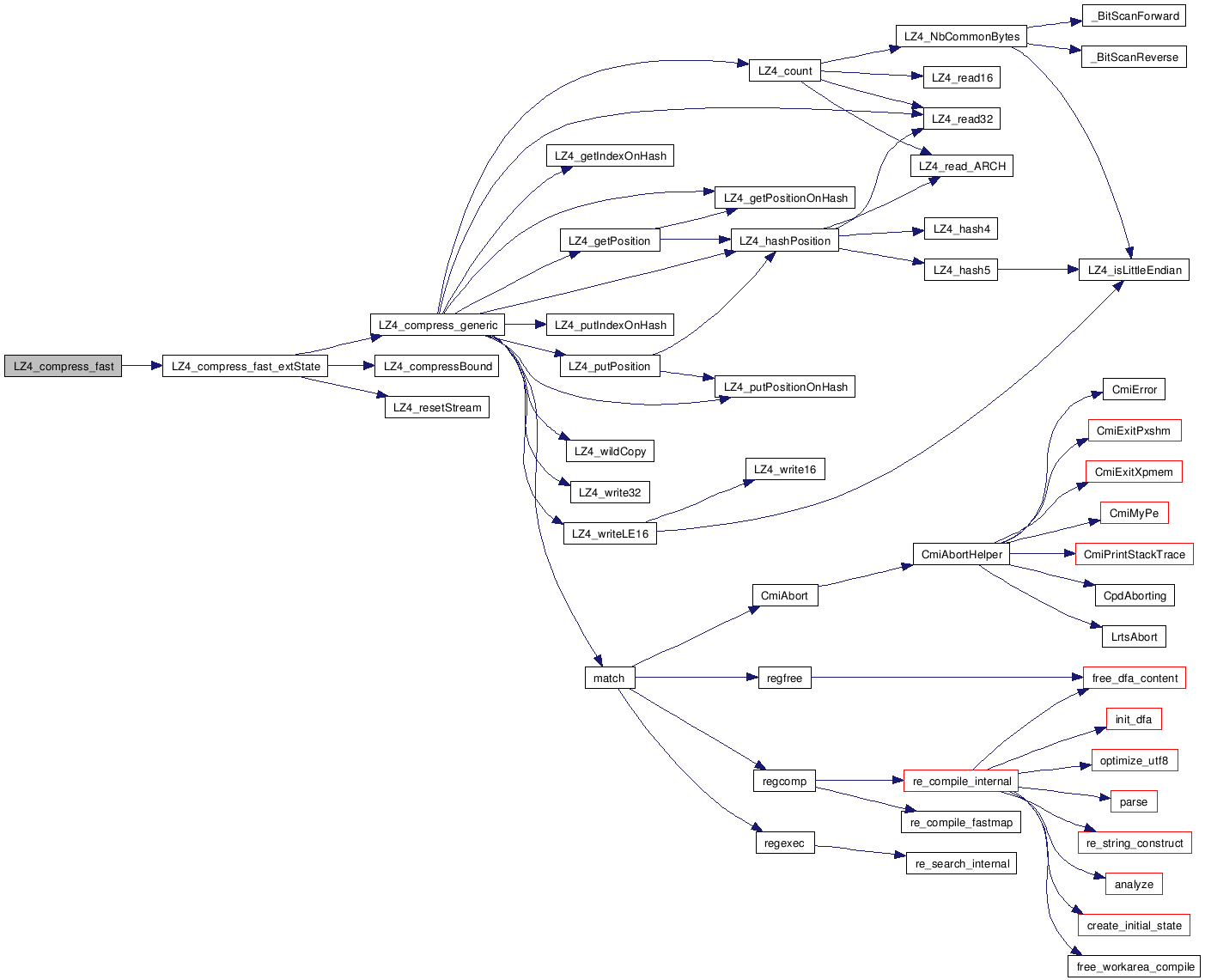

| LZ4LIB_API int LZ4_sizeofState | ( | void | ) |
LZ4_compress_fast_extState() : Same compression function, just using an externally allocated memory space to store compression state. Use LZ4_sizeofState() to know how much memory must be allocated, and allocate it on 8-bytes boundaries (using malloc() typically). Then, provide this buffer as 'void* state' to compression function.
| LZ4LIB_API int LZ4_compress_fast_extState | ( | void * | state, | |
| const char * | src, | |||
| char * | dst, | |||
| int | srcSize, | |||
| int | dstCapacity, | |||
| int | acceleration | |||
| ) |
Definition at line 1010 of file lz4.c.
References byPtr, byU16, byU32, limitedOutput, LZ4_compress_generic(), LZ4_compressBound(), LZ4_resetStream(), noDict, noDictIssue, and notLimited.
Referenced by LZ4_compress_destSize_extState(), LZ4_compress_fast(), LZ4_compress_limitedOutput_withState(), and LZ4_compress_withState().
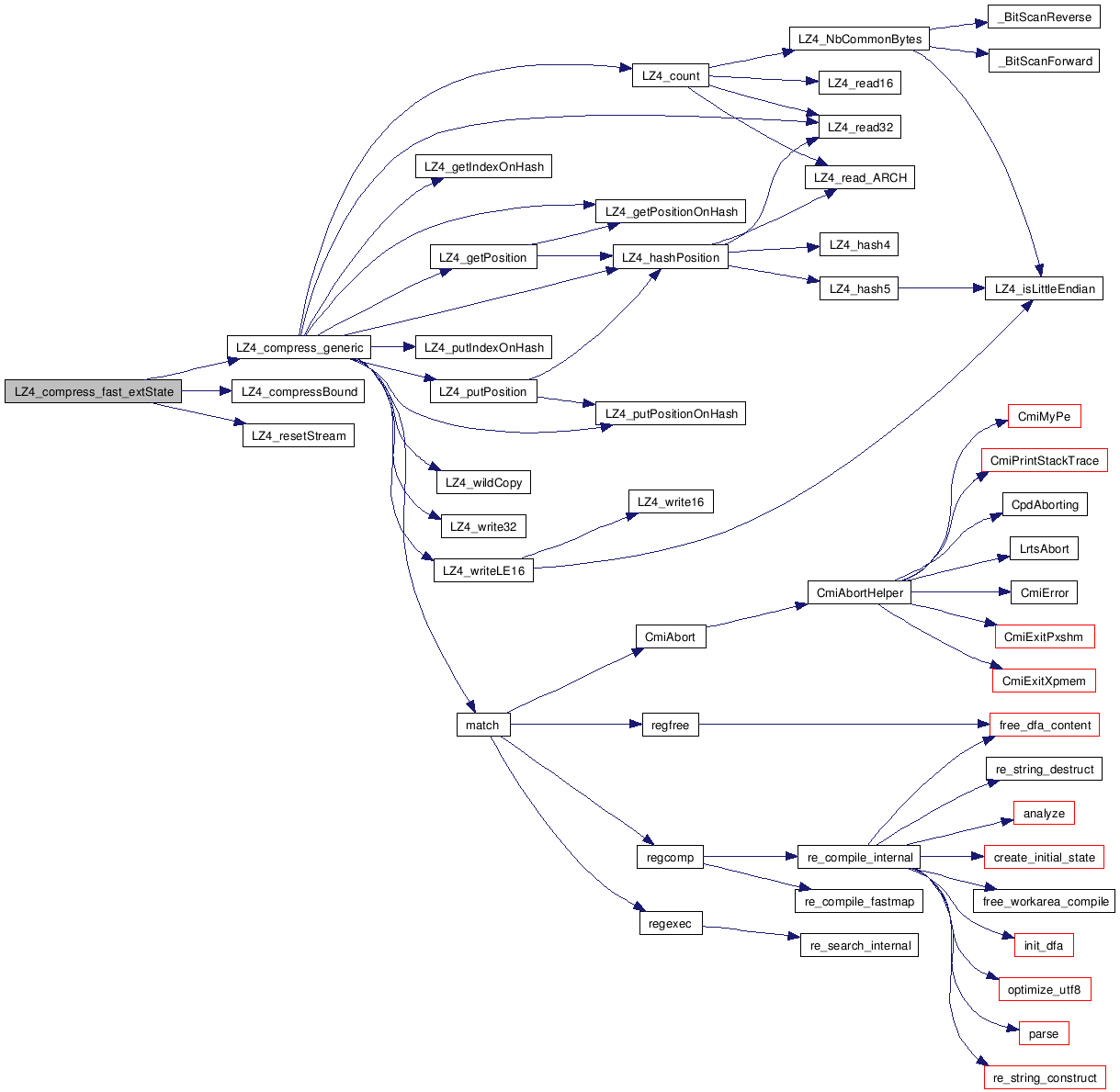

| LZ4LIB_API int LZ4_compress_destSize | ( | const char * | src, | |
| char * | dst, | |||
| int * | srcSizePtr, | |||
| int | targetDstSize | |||
| ) |
LZ4_compress_destSize() : Reverse the logic : compresses as much data as possible from 'src' buffer into already allocated buffer 'dst', of size >= 'targetDestSize'. This function either compresses the entire 'src' content into 'dst' if it's large enough, or fill 'dst' buffer completely with as much data as possible from 'src'. note: acceleration parameter is fixed to "default".
*srcSizePtr : will be modified to indicate how many bytes where read from 'src' to fill 'dst'. New value is necessarily <= input value.
Definition at line 1136 of file lz4.c.
References LZ4_compress_destSize_extState().
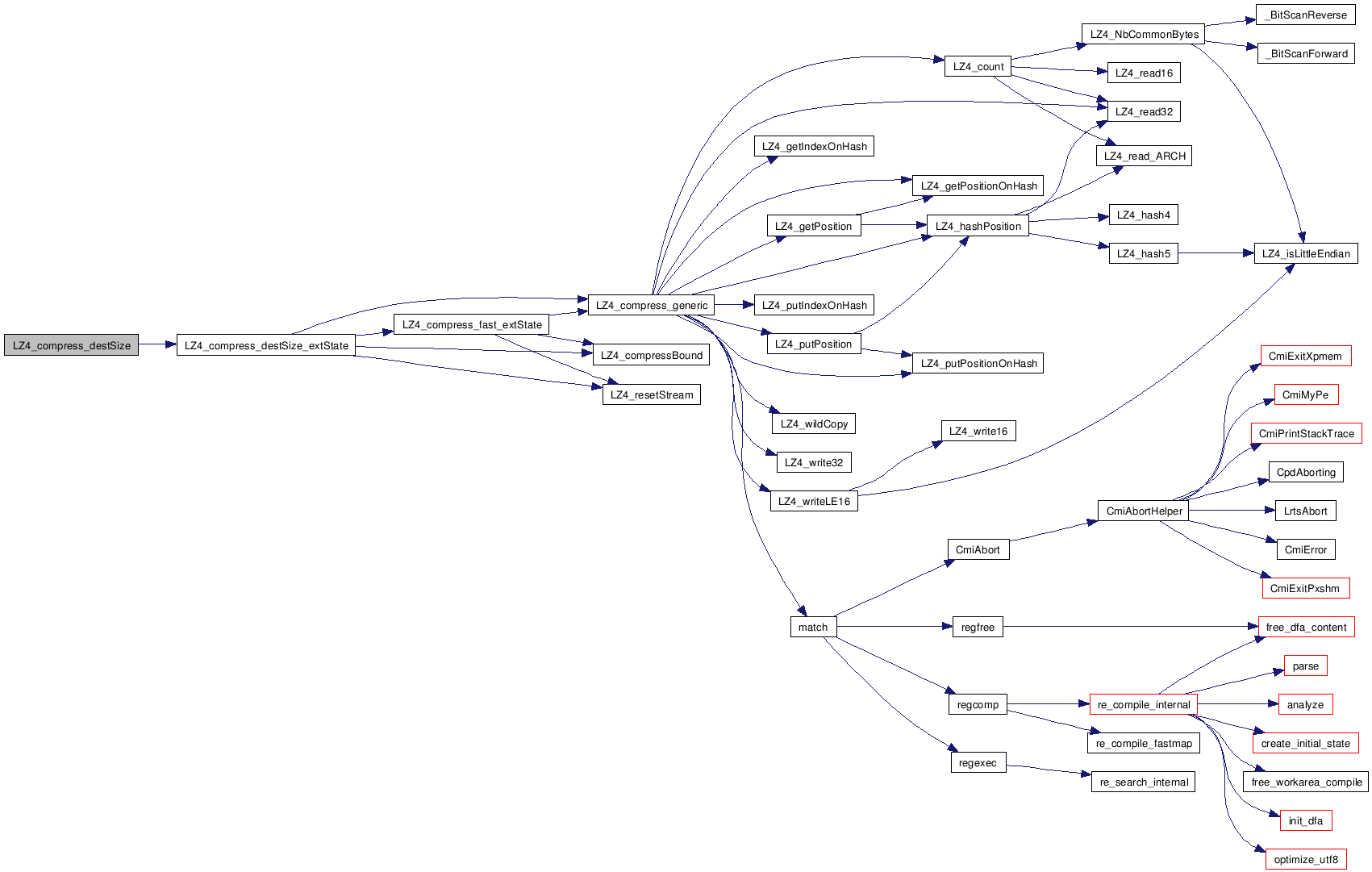
LZ4_decompress_fast() : **unsafe!** This function used to be a bit faster than LZ4_decompress_safe(), though situation has changed in recent versions, and now `LZ4_decompress_safe()` can be as fast and sometimes faster than `LZ4_decompress_fast()`. Moreover, LZ4_decompress_fast() is not protected vs malformed input, as it doesn't perform full validation of compressed data. As a consequence, this function is no longer recommended, and may be deprecated in future versions. It's only remaining specificity is that it can decompress data without knowing its compressed size.
originalSize : is the uncompressed size to regenerate. `dst` must be already allocated, its size must be >= 'originalSize' bytes.
Definition at line 1668 of file lz4.c.
References decode_full_block, endOnOutputSize, LZ4_decompress_generic(), and withPrefix64k.
Referenced by LZ4_decompress_fast_continue(), LZ4_decompress_fast_usingDict(), LZ4_decompress_fast_withPrefix64k(), and LZ4_uncompress().
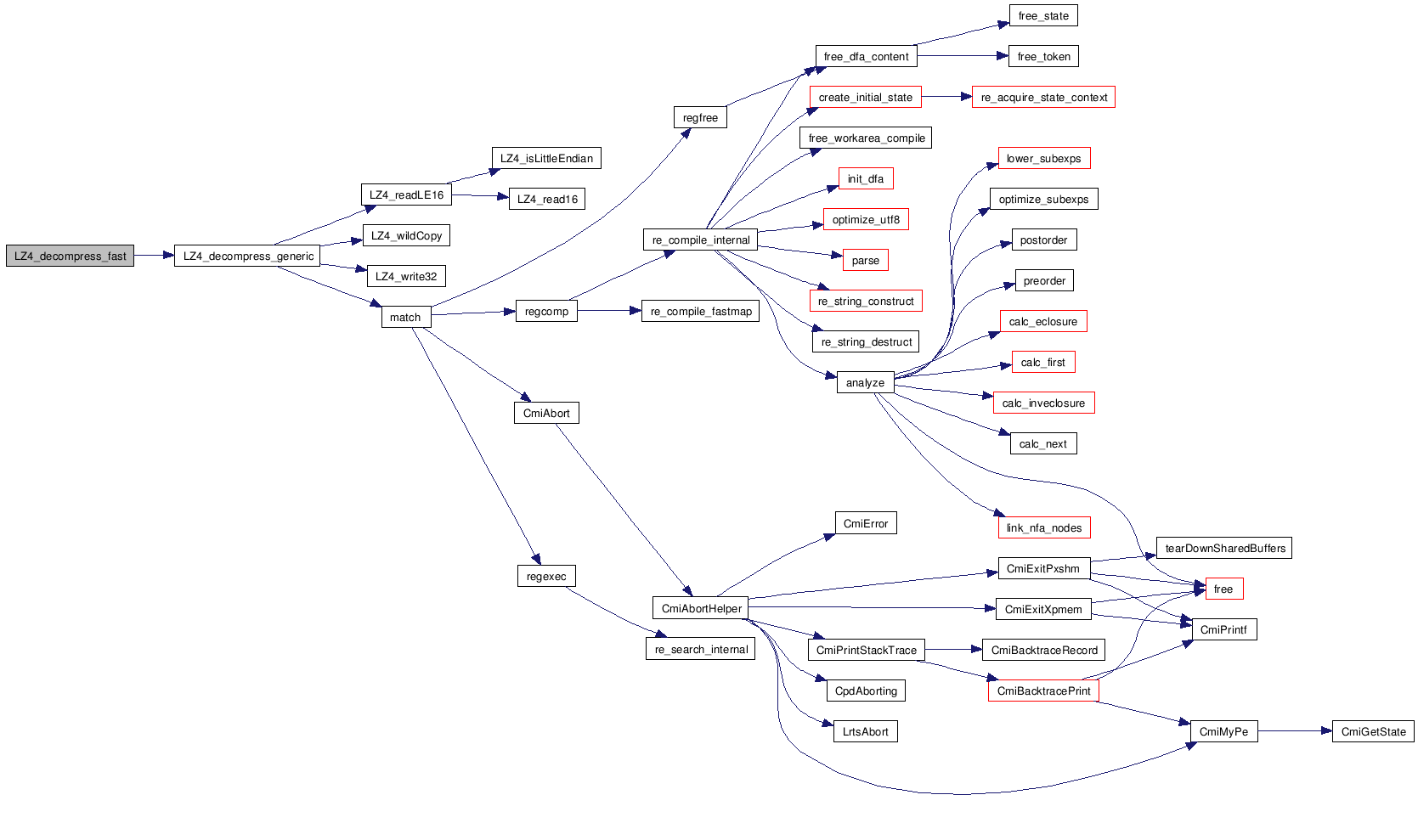
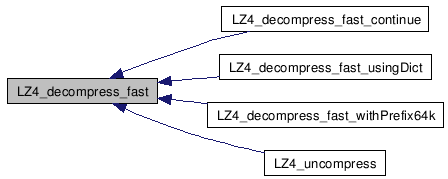
| LZ4LIB_API int LZ4_decompress_safe_partial | ( | const char * | src, | |
| char * | dst, | |||
| int | srcSize, | |||
| int | targetOutputSize, | |||
| int | dstCapacity | |||
| ) |
LZ4_decompress_safe_partial() : Decompress an LZ4 compressed block, of size 'srcSize' at position 'src', into destination buffer 'dst' of size 'dstCapacity'. Up to 'targetOutputSize' bytes will be decoded. The function stops decoding on reaching this objective, which can boost performance when only the beginning of a block is required.
Definition at line 1659 of file lz4.c.
References endOnInputSize, LZ4_decompress_generic(), noDict, and partial_decode.

| LZ4LIB_API LZ4_stream_t* LZ4_createStream | ( | void | ) |
LZ4_createStream() and LZ4_freeStream() : LZ4_createStream() will allocate and initialize an `LZ4_stream_t` structure. LZ4_freeStream() releases its memory.
Definition at line 1160 of file lz4.c.
References LZ4_resetStream().
Referenced by LZ4_create().


| LZ4LIB_API int LZ4_freeStream | ( | LZ4_stream_t * | streamPtr | ) |
| LZ4LIB_API void LZ4_resetStream | ( | LZ4_stream_t * | streamPtr | ) |
LZ4_resetStream() : An LZ4_stream_t structure can be allocated once and re-used multiple times. Use this function to start compressing a new stream.
Definition at line 1170 of file lz4.c.
Referenced by LZ4_compress_destSize_extState(), LZ4_compress_fast_extState(), LZ4_compress_fast_force(), LZ4_createStream(), LZ4_loadDict(), and LZ4_resetStreamState().

| LZ4LIB_API int LZ4_loadDict | ( | LZ4_stream_t * | streamPtr, | |
| const char * | dictionary, | |||
| int | dictSize | |||
| ) |
LZ4_loadDict() : Use this function to load a static dictionary into LZ4_stream_t. Any previous data will be forgotten, only 'dictionary' will remain in memory. Loading a size of 0 is allowed, and is the same as reset.
Definition at line 1190 of file lz4.c.
References byU32, LZ4_stream_t_internal::currentOffset, LZ4_stream_t_internal::dictionary, LZ4_stream_t_internal::dictSize, LZ4_stream_t_internal::hashTable, LZ4_stream_u::internal_donotuse, LZ4_putPosition(), LZ4_resetStream(), p, and LZ4_stream_t_internal::tableType.

| LZ4LIB_API int LZ4_compress_fast_continue | ( | LZ4_stream_t * | streamPtr, | |
| const char * | src, | |||
| char * | dst, | |||
| int | srcSize, | |||
| int | dstCapacity, | |||
| int | acceleration | |||
| ) |
LZ4_compress_fast_continue() : Compress 'src' content using data from previously compressed blocks, for better compression ratio. 'dst' buffer must be already allocated. If dstCapacity >= LZ4_compressBound(srcSize), compression is guaranteed to succeed, and runs faster.
Note 2 : The previous 64KB of source data is __assumed__ to remain present, unmodified, at same address in memory!
Note 3 : When input is structured as a double-buffer, each buffer can have any size, including < 64 KB. Make sure that buffers are separated, by at least one byte. This construction ensures that each block only depends on previous block.
Note 4 : If input buffer is a ring-buffer, it can have any size, including < 64 KB.
Note 5 : After an error, the stream status is invalid, it can only be reset or freed.
Definition at line 1268 of file lz4.c.
References byU32, LZ4_stream_t_internal::currentOffset, LZ4_stream_t_internal::dictCtx, LZ4_stream_t_internal::dictionary, LZ4_stream_t_internal::dictSize, dictSmall, LZ4_stream_t_internal::initCheck, LZ4_stream_u::internal_donotuse, limitedOutput, LZ4_compress_generic(), LZ4_renormDictT(), noDictIssue, usingDictCtx, usingExtDict, and withPrefix64k.
Referenced by LZ4_compress_continue(), and LZ4_compress_limitedOutput_continue().
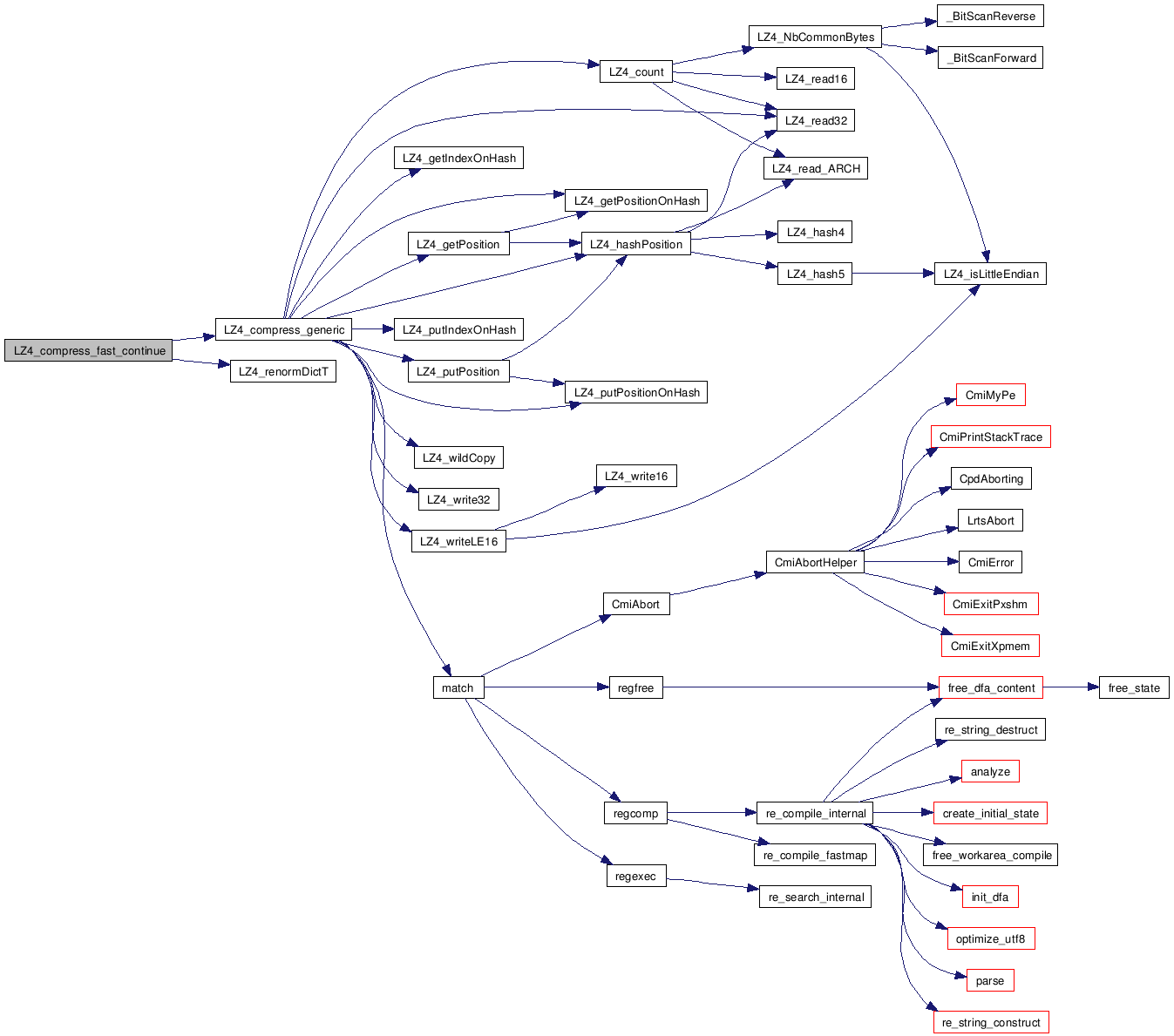

| LZ4LIB_API int LZ4_saveDict | ( | LZ4_stream_t * | LZ4_dict, | |
| char * | safeBuffer, | |||
| int | dictSize | |||
| ) |
LZ4_saveDict() : If last 64KB data cannot be guaranteed to remain available at its current memory location, save it into a safer place (char* safeBuffer). This is schematically equivalent to a memcpy() followed by LZ4_loadDict(), but is much faster, because LZ4_saveDict() doesn't need to rebuild tables.
Definition at line 1368 of file lz4.c.
References LZ4_stream_t_internal::dictionary, LZ4_stream_t_internal::dictSize, and LZ4_stream_u::internal_donotuse.
| LZ4LIB_API LZ4_streamDecode_t* LZ4_createStreamDecode | ( | void | ) |
LZ4_createStreamDecode() and LZ4_freeStreamDecode() : creation / destruction of streaming decompression tracking context. A tracking context can be re-used multiple times.
| LZ4LIB_API int LZ4_freeStreamDecode | ( | LZ4_streamDecode_t * | LZ4_stream | ) |
| LZ4LIB_API int LZ4_setStreamDecode | ( | LZ4_streamDecode_t * | LZ4_streamDecode, | |
| const char * | dictionary, | |||
| int | dictSize | |||
| ) |
LZ4_setStreamDecode() : An LZ4_streamDecode_t context can be allocated once and re-used multiple times. Use this function to start decompression of a new stream of blocks. A dictionary can optionally be set. Use NULL or size 0 for a reset order. Dictionary is presumed stable : it must remain accessible and unmodified during next decompression.
Definition at line 1764 of file lz4.c.
References LZ4_streamDecode_t_internal::extDictSize, LZ4_streamDecode_t_internal::externalDict, LZ4_streamDecode_u::internal_donotuse, LZ4_streamDecode_t_internal::prefixEnd, LZ4_streamDecode_t_internal::prefixSize, and size_t.
LZ4_decoderRingBufferSize() : v1.8.2 Note : in a ring buffer scenario (optional), blocks are presumed decompressed next to each other up to the moment there is not enough remaining space for next block (remainingSize < maxBlockSize), at which stage it resumes from beginning of ring buffer. When setting such a ring buffer for streaming decompression, provides the minimum size of this ring buffer to be compatible with any source respecting maxBlockSize condition.
| LZ4LIB_API int LZ4_decompress_safe_continue | ( | LZ4_streamDecode_t * | LZ4_streamDecode, | |
| const char * | src, | |||
| char * | dst, | |||
| int | srcSize, | |||
| int | dstCapacity | |||
| ) |
LZ4_decompress_*_continue() : These decoding functions allow decompression of consecutive blocks in "streaming" mode. A block is an unsplittable entity, it must be presented entirely to a decompression function. Decompression functions only accepts one block at a time. The last 64KB of previously decoded data *must* remain available and unmodified at the memory position where they were decoded. If less than 64KB of data has been decoded, all the data must be present.
Special : if decompression side sets a ring buffer, it must respect one of the following conditions :
Whenever these conditions are not possible, save the last 64KB of decoded data into a safe buffer where it can't be modified during decompression, then indicate where this data is saved using LZ4_setStreamDecode(), before decompressing next block.
Definition at line 1801 of file lz4.c.
References assert, LZ4_streamDecode_t_internal::extDictSize, LZ4_streamDecode_t_internal::externalDict, LZ4_streamDecode_u::internal_donotuse, LZ4_decompress_safe(), LZ4_decompress_safe_doubleDict(), LZ4_decompress_safe_forceExtDict(), LZ4_decompress_safe_withPrefix64k(), LZ4_decompress_safe_withSmallPrefix(), LZ4_streamDecode_t_internal::prefixEnd, and LZ4_streamDecode_t_internal::prefixSize.
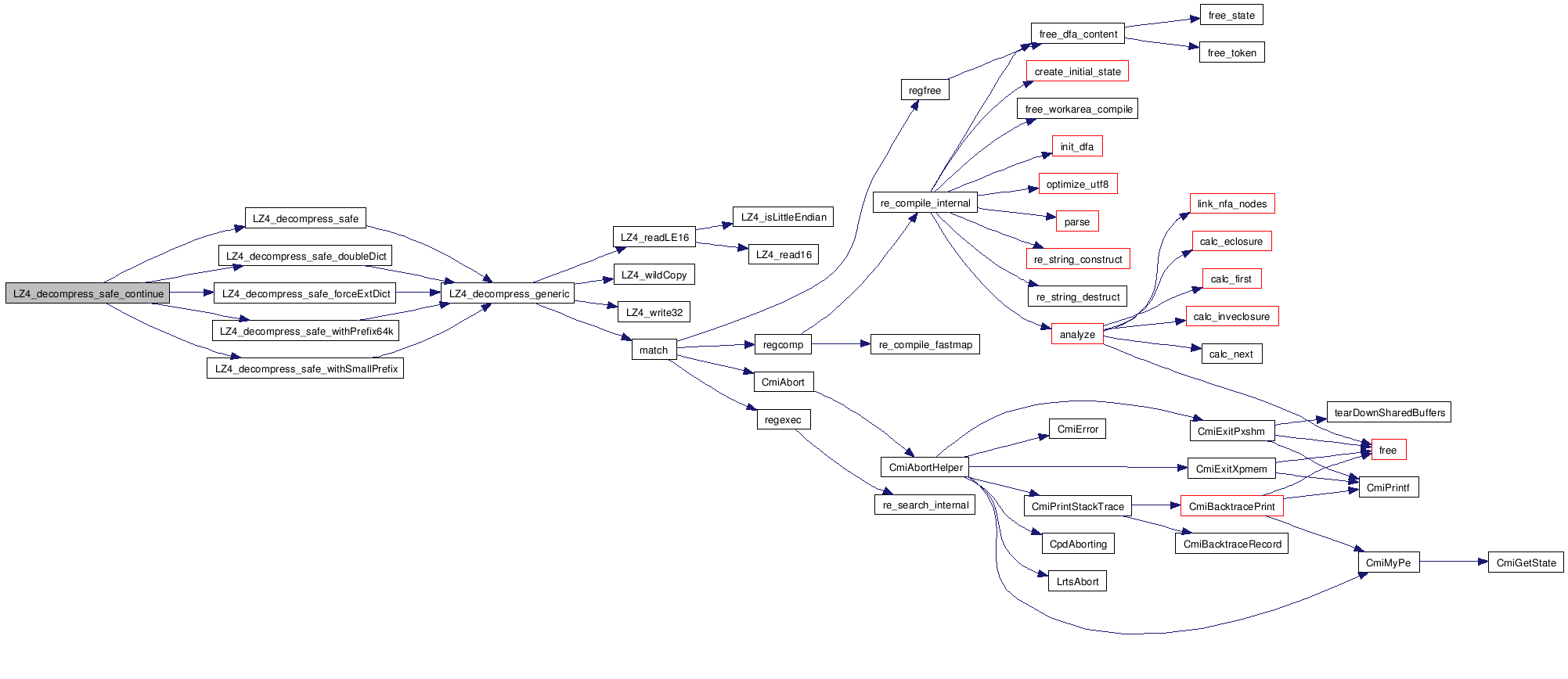
| LZ4LIB_API int LZ4_decompress_fast_continue | ( | LZ4_streamDecode_t * | LZ4_streamDecode, | |
| const char * | src, | |||
| char * | dst, | |||
| int | originalSize | |||
| ) |
Definition at line 1841 of file lz4.c.
References assert, LZ4_streamDecode_t_internal::extDictSize, LZ4_streamDecode_t_internal::externalDict, LZ4_streamDecode_u::internal_donotuse, LZ4_decompress_fast(), LZ4_decompress_fast_doubleDict(), LZ4_decompress_fast_extDict(), LZ4_streamDecode_t_internal::prefixEnd, and LZ4_streamDecode_t_internal::prefixSize.

| LZ4LIB_API int LZ4_decompress_safe_usingDict | ( | const char * | src, | |
| char * | dst, | |||
| int | srcSize, | |||
| int | dstCapcity, | |||
| const char * | dictStart, | |||
| int | dictSize | |||
| ) |
LZ4_decompress_*_usingDict() : These decoding functions work the same as a combination of LZ4_setStreamDecode() followed by LZ4_decompress_*_continue() They are stand-alone, and don't need an LZ4_streamDecode_t structure. Dictionary is presumed stable : it must remain accessible and unmodified during next decompression.
Definition at line 1882 of file lz4.c.
References LZ4_decompress_safe(), LZ4_decompress_safe_forceExtDict(), LZ4_decompress_safe_withPrefix64k(), and LZ4_decompress_safe_withSmallPrefix().
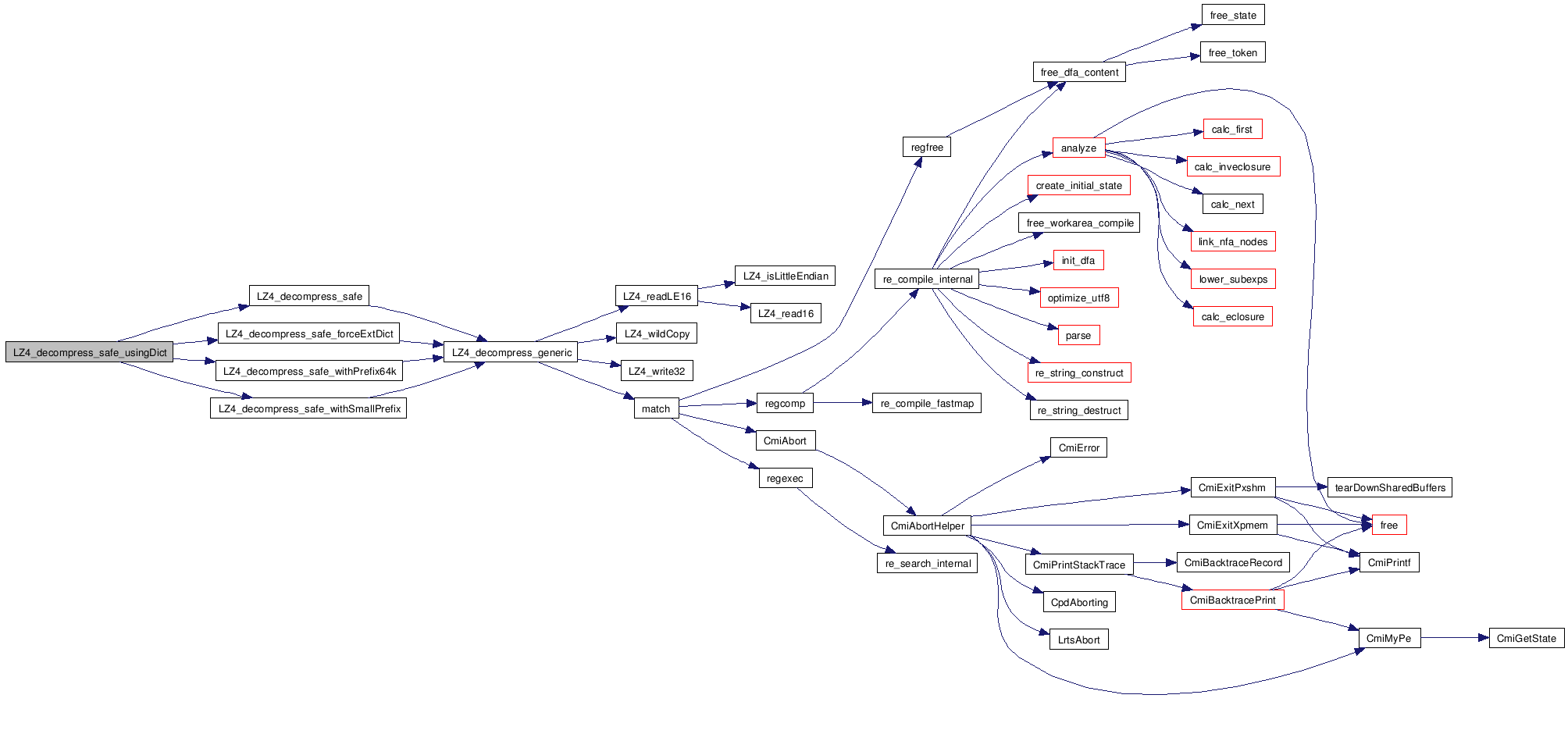
| LZ4LIB_API int LZ4_decompress_fast_usingDict | ( | const char * | src, | |
| char * | dst, | |||
| int | originalSize, | |||
| const char * | dictStart, | |||
| int | dictSize | |||
| ) |
Definition at line 1894 of file lz4.c.
References LZ4_decompress_fast(), and LZ4_decompress_fast_extDict().
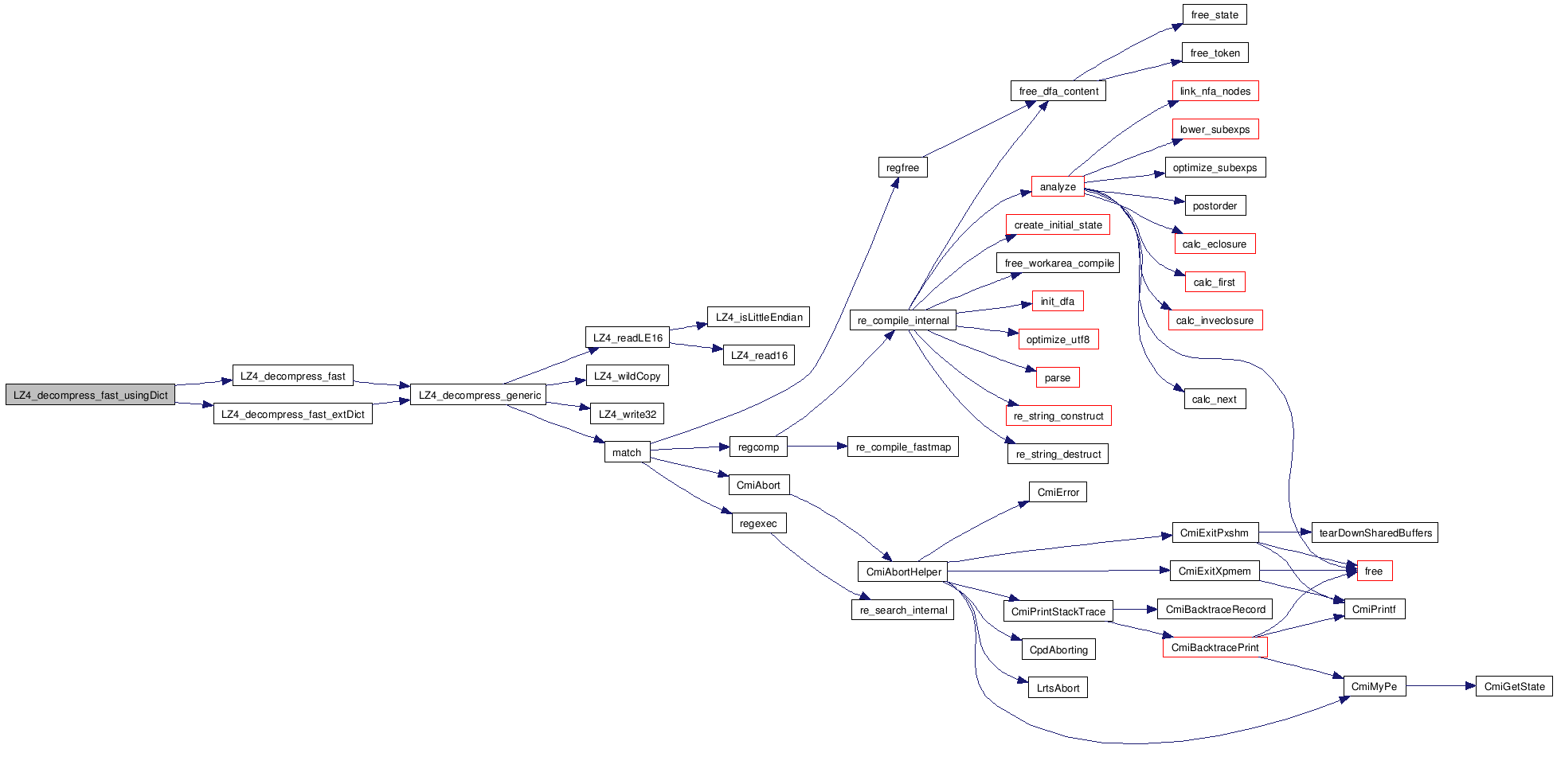
| LZ4LIB_API void LZ4_resetStream_fast | ( | LZ4_stream_t * | streamPtr | ) |
LZ4_resetStream_fast() : Use this, like LZ4_resetStream(), to prepare a context for a new chain of calls to a streaming API (e.g., LZ4_compress_fast_continue()).
Note: Using this in advance of a non- streaming-compression function is redundant, and potentially bad for performance, since they all perform their own custom reset internally.
Differences from LZ4_resetStream(): When an LZ4_stream_t is known to be in a internally coherent state, it can often be prepared for a new compression with almost no work, only sometimes falling back to the full, expensive reset that is always required when the stream is in an indeterminate state (i.e., the reset performed by LZ4_resetStream()).
LZ4_streams are guaranteed to be in a valid state when:
When a stream isn't known to be in a valid state, it is not safe to pass to any fastReset or streaming function. It must first be cleansed by the full LZ4_resetStream().
Definition at line 1176 of file lz4.c.
References byU32, LZ4_stream_u::internal_donotuse, and LZ4_prepareTable().

| LZ4LIB_API int LZ4_compress_fast_extState_fastReset | ( | void * | state, | |
| const char * | src, | |||
| char * | dst, | |||
| int | srcSize, | |||
| int | dstCapacity, | |||
| int | acceleration | |||
| ) |
LZ4_compress_fast_extState_fastReset() : A variant of LZ4_compress_fast_extState().
LZ4_compress_fast_extState_fastReset() : A variant of LZ4_compress_fast_extState().
Using this variant avoids an expensive initialization step. It is only safe to call if the state buffer is known to be correctly initialized already (see above comment on LZ4_resetStream_fast() for a definition of "correctly initialized"). From a high level, the difference is that this function initializes the provided state with a call to something like LZ4_resetStream_fast() while LZ4_compress_fast_extState() starts with a call to LZ4_resetStream().
Using this variant avoids an expensive initialization step. It is only safe to call if the state buffer is known to be correctly initialized already (see comment in lz4.h on LZ4_resetStream_fast() for a definition of "correctly initialized").
Definition at line 1041 of file lz4.c.
References byPtr, byU16, byU32, LZ4_stream_t_internal::currentOffset, dictSmall, limitedOutput, LZ4_compress_generic(), LZ4_compressBound(), LZ4_prepareTable(), noDict, noDictIssue, and notLimited.
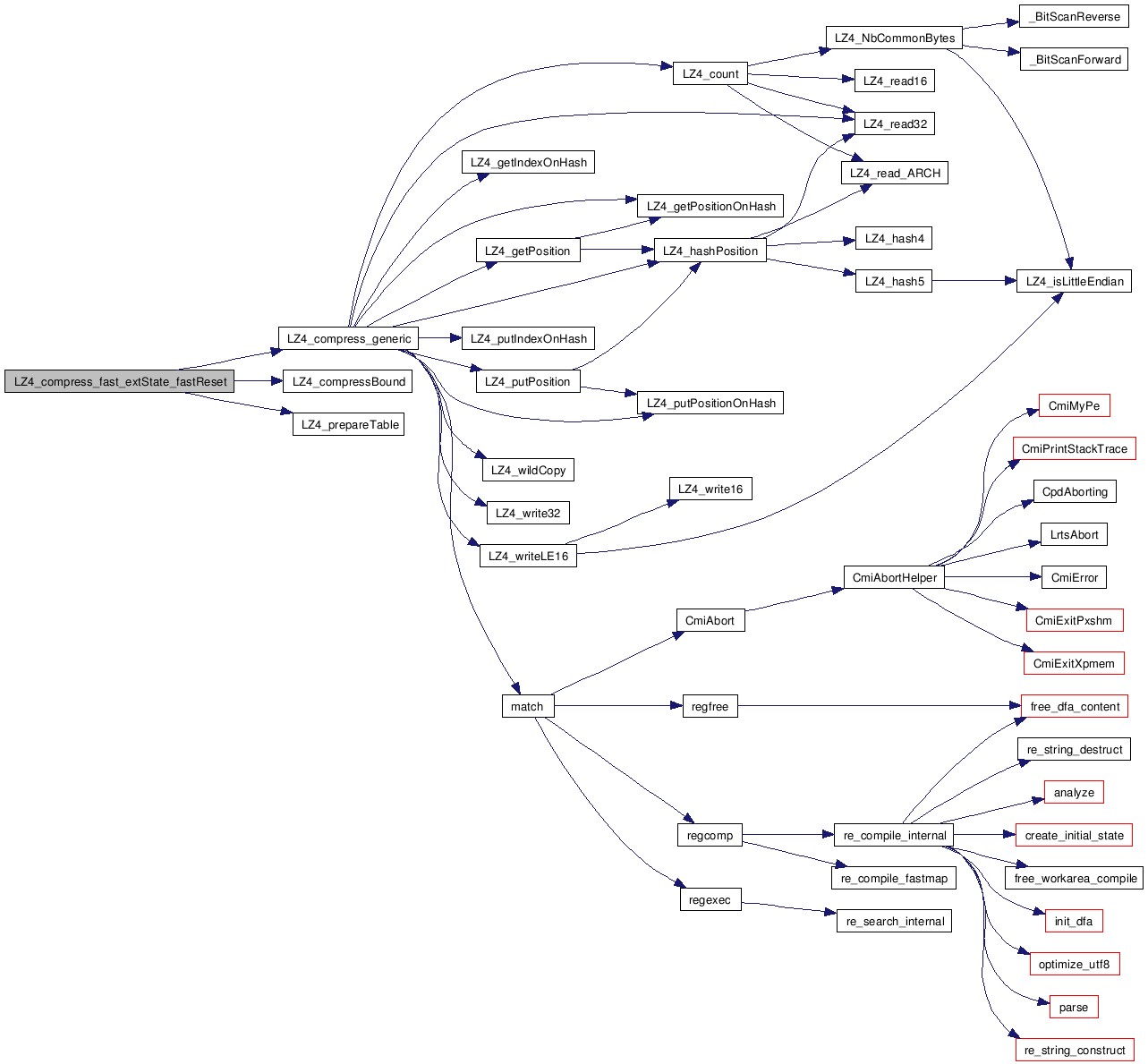
| LZ4LIB_API void LZ4_attach_dictionary | ( | LZ4_stream_t * | working_stream, | |
| const LZ4_stream_t * | dictionary_stream | |||
| ) |
LZ4_attach_dictionary() : This is an experimental API that allows for the efficient use of a static dictionary many times.
Rather than re-loading the dictionary buffer into a working context before each compression, or copying a pre-loaded dictionary's LZ4_stream_t into a working LZ4_stream_t, this function introduces a no-copy setup mechanism, in which the working stream references the dictionary stream in-place.
Several assumptions are made about the state of the dictionary stream. Currently, only streams which have been prepared by LZ4_loadDict() should be expected to work.
Alternatively, the provided dictionary stream pointer may be NULL, in which case any existing dictionary stream is unset.
If a dictionary is provided, it replaces any pre-existing stream history. The dictionary contents are the only history that can be referenced and logically immediately precede the data compressed in the first subsequent compression call.
The dictionary will only remain attached to the working stream through the first compression call, at the end of which it is cleared. The dictionary stream (and source buffer) must remain in-place / accessible / unchanged through the completion of the first compression call on the stream.
Definition at line 1232 of file lz4.c.
References LZ4_stream_t_internal::currentOffset, LZ4_stream_t_internal::dictCtx, and LZ4_stream_u::internal_donotuse.
| LZ4_DEPRECATED | ( | "use LZ4_compress_default() instead" | ) | const |
| LZ4_DEPRECATED | ( | "use LZ4_compress_fast_extState() instead" | ) |
| LZ4_DEPRECATED | ( | "use LZ4_compress_fast_continue() instead" | ) |
| LZ4_DEPRECATED | ( | "use LZ4_decompress_fast() instead" | ) | const |
| LZ4_DEPRECATED | ( | "use LZ4_decompress_safe() instead" | ) | const |
| LZ4_DEPRECATED | ( | "Use LZ4_createStream() instead" | ) |
| LZ4_DEPRECATED | ( | "Use LZ4_resetStream() instead" | ) |
| LZ4_DEPRECATED | ( | "Use LZ4_saveDict() instead" | ) |
| LZ4_DEPRECATED | ( | "use LZ4_decompress_safe_usingDict() instead" | ) | const |
| LZ4_DEPRECATED | ( | "use LZ4_decompress_fast_usingDict() instead" | ) | const |
| char int sourceSize |
| char int int maxOutputSize |
| char int outputSize |
| char* inputBuffer |
| char * dst |
Definition at line 623 of file lz4.h.
Referenced by AMPI_Alltoall_long(), AMPI_Alltoall_medium(), AMPI_Alltoall_short(), AMPI_API_IMPL(), check_dst_limits_calc_pos_1(), CkDDT_SetName(), main(), and PUPbytes().
| char int compressedSize |
| char int int maxDstSize |
| char int originalSize |
 1.5.5
1.5.5